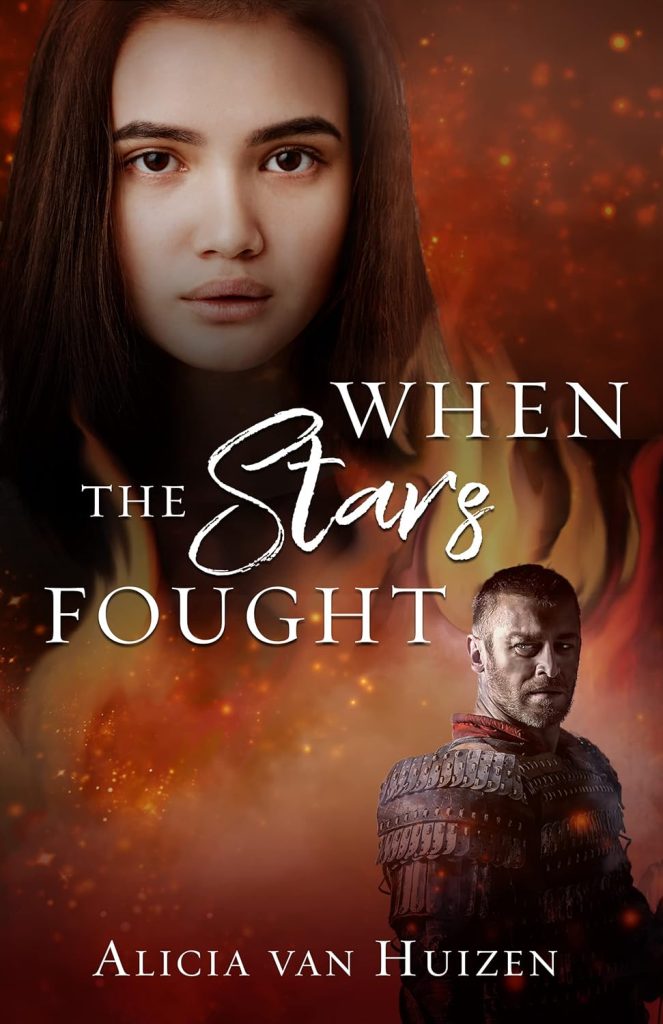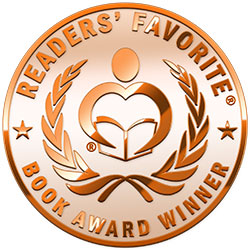The story of God’s prophet Elisha healing Naaman, a great warrior and enemy of God, was one of my Bible favorite stories as a kid. I was always intrigued by the young Israelite girl who was the catalyst in this story. When Naaman was struck by leprosy, she’s the one who told him about Elisha.
Author Alicia Van Huizen has brought this story to life in a most excellent way in When the Stars Fought. Her version gave me new insights into the story, well beyond the limits of my childlike perceptions.
Naaman had three strikes against him:
- he’s a Gentile, not one of God’s chosen people
- he’s an enemy of God and God’s people
- he could lose everything when he’s stricken with leprosy
I never realized just how much Naaman had pillaged, plundered, and killed. Even so, God chose Naaman to heal from leprosy, to prove “there was still a God in Israel.” As a result, Nathan’s entire life turned around.
If that’s not evidence of God’s graciousness and mercy to the undeserving, I don’t know what is. Of course, nobody is more deserving than another. We’re all under the same curse of sin. But God didn’t have to heal somebody who had caused such heartache and damage to His chosen ones and their land.
This story brings hope. There is nobody beyond God’s mercy. Whoever you are, or whoever you are praying for, don’t lose hope and don’t stop praying!
This novel is based on the context of I Kings 20-21 and II Kings 5.

Blurb
What if the man who killed your family needed help only you could give?
Thirteen-year-old Oriel dreams of leading Israel to victory over their enemies, just like the bold and daring heroines of her faith. But those dreams are shattered when a long-standing feud between nations flares up again and she is taken captive to pagan Damascus. Abandoned by the God of her fathers, she struggles to hold on to faith and find purpose in her captivity. But when she comes face-to-face with the man who slaughtered her family, bitterness threatens to snuff out what little faith she has scraped together right when she—and the murderer—need it most.
Tasked with reclaiming Syria’s glory, Commander Na’aman conducts raids into the land of Israel. But when he unexpectedly collides with a strange prophet and witnesses the power of Israel’s mysterious God, he is left shaken. Does the God of Israel have more power than his gods? Na’aman is not convinced. Until the leprosy appears. Has Israel’s God at last taken revenge on him? Stripped of his title, his dignity, and cast out from society, he has nowhere left to turn. Except to his enemies.
*******************
My thoughts
This story gripped me from the first page—even though I’ve known this Bible tale since I was a child, and knew the ending. Everything here was fleshed out with relevant historical background, vivid sensory details, and three-dimensional characters. It left me thinking this is how it could have happened.
But as always, Biblical fiction should drive us to the source. This story stayed true to the Biblical account while filling in the gaps. Reading the novel was an immersive experience, a dive into ancient Old Testament Bible lands during the time of the prophet Elisha when the Syrian army ravages Israel and takes captives.
Thirteen-year-old Oriel has lost everything—her family, her homeland, her freedom, her hope, her trust in the Hebrew God and His supposed loving care for His people. Rather than enjoying the love, safety, and security of her family, she finds herself in faraway Damascus as a slave. Rather than the joy of youth, she is full of bitterness.
Na’aman, commander of the Syrian army, is ruthless and powerful—until he is attacked by leprosy. The way his life intertwines with Oriel’s is both realistic and riveting.
The author employs three points of view: Oriel, the Jewish girl; Peniel, advisor to Israel’s king in Samaria; and Naaman. I really loved the character of Peniel too, as his conscience wrestled through tough situations.
Leaning literary, this engaging and beautifully written novel keeps the stakes high and tension rising while illustrating how two lives—a hardened warrior and an innocent girl—change for the better and learn there is still a God in Israel who brings beauty out of ashes.
********************
Questions about When the Stars Fought
What led you to writing Biblical fiction? Have you dabbled in other genres?
As a teenager, I began with fantasy. But I knew God had called me to write and that He had a very different story for me to share. I just didn’t know what at the time.
How and why did you choose this Old Testament story of Naaman to start with?
It all started out of my quiet time with the Lord. I was reading through the story when the little slave girl jumped out at me like I’ve never seen her before, though I’ve read this passage many times. It was like I saw a movie scene play out before my eyes where the raiders burned her village, killed her family, and took her captive.
Na’aman, as the commander, would have been responsible. We would have applauded her had she only forgiven him and moved on with her life. But somehow, something shifted inside her. She went beyond forgiveness and actually desired that he would be healed. How? I was so flabbergasted by that realization. I just knew hers was the story I needed to share.
One of many ironies in this story! How and why did you choose the three points of view you utilized? Were you in charge or did these characters hijack the story?
I originally only intended to have Oriel’s and Na’aman’s point of views. However, I quickly realized that in order to see into the political machinations of the Jewish court, I would need a man on the inside. Thus, Peniel was born. In that sense, he did “hijack” the story, quickly becoming more central than I ever intended.
Mursili’s character was also created originally as a much-needed comic relief. But he also soon wove his way into an integral position both in Oriel’s journey but also in Na’aman’s. That did surprise me. Hah.
Proving that writing is never dull! How do you decide how to distinguish Biblical characters from each other when it doesn’t seem like they had as much variety and choices in their daily lives?
Great question! It certainly is more limited. But I focused on distinguishing my characters through their voice, both internal and external. Their personalities become visible through how they react to others, or don’t. Their expressions and other non-verbal communications expose the undercurrent of thought that separates one from the other. How we communicate can reveal so much about personality.
You definitely did that well. What’s the most unusual thing you had to do, learn, or research to create this story?
I’m not sure I would consider any of my research unusual. Hah. Besides studying the Biblical text, I could have done so much more research, but I did learn some interesting facts about funerary rites, horse feed, the palace in Samaria, and the ingredients for soap.
Which cultural details did you have to fill in with your imagination?
More than I would have liked. It’s more difficult to research the social interactions and protocol vs more observable facts like cooking methods.
Which scene was particularly challenging to write, and why?
I think it was more the series of Oriel’s dramatic moments. She had a couple of traumas happen, from the killing of her family to discovering Na’aman’s identity, and, on top of that, the unbridled teenage emotion spilling everywhere in the aftermath of those traumas. Understandable and yet chaotic. I found it challenging to not overdo the drama while at the same time allowing her to fully feel the weight of her emotions.
Another challenge was in letting each scene have an emotional arc with distinct descriptions. Some were less intense. Some considerably more. But they all had to be distinct from one another, yet at the same time be true to Oriel’s process and where she was currently at.
Questions about your writing
Which books and/or authors have most inspired you in your writing journey?
Traci Higley’s Biblical fiction. The excellence and ease of her writing style is so invigorating to me. Also, her book Nightfall in the Garden of Deep Time (not Biblical fiction), is such an encouragement for writers or really any creative person like myself.
I absolutely agree! I even featured Tracy’s book on the blog. Do you outline your stories or wing it? Explain your novel writing process.
Haha, well this was my first novel, so it may change. Who knows? But I had a very basic outline detailing the main points that I needed my characters to get to. But the how was a whole lot of winging.
With each scene, I would often just close my eyes and envision it unfold as I ask questions. Where do I need to get my characters to? What emotions do they need to be wrestling with? What do they need to overcome?
Not everybody embraces fictionalized versions of Bible stories. What concerns do you have about writing Biblical fiction?
None! I am writing a fictional account that is in no way meant to replace the Word. I do understand the concern of not wanting to misrepresent the Bible. But that’s why I pray and ask the Holy Spirit to help me represent Him well through my words.
By far, the greater concern that I see in our days is the lack, especially in my generation, of people who actually read the Bible and know the Word of God. So many view the Bible as an ancient text that is distant, unapproachable, and irrelevant for our times. If I can, through my writing, help close that gap so that they discover a love for the Word again, and begin reading it for themselves, why would I not be excited for that opportunity?
Rather than shy away from Biblical fiction out of fear, I see it as a beautiful tool to ultimately invite others closer to the Word of God, to the Author and Finisher of our faith.
That’s a great way to view your purpose and motivation. What’s next for you as an author? Please share something about a current project or the direction you want to go.
I am working on a short story about King David bringing the ark of the covenant back to Jerusalem. And while I do have many other bibfic novels in mind, I am about to give birth to my second baby. By the time this interview comes out she/he will be here! So we will see how that progresses. I am still learning how to take the advice I would give to my younger self (see next question). Sometimes, its a daily choice.
If you could tell your younger writing self anything, what would it be?
Join a critique group! If this is really what you feel called to, then commit. Don’t make excuses. Count the cost, and commit.
**********************
Back to Laura . . . On a similar note . . .
If you like historical fiction, you might enjoy my newest novel A Hundred Magical Reasons (launched January 2025). This story spotlights L. Frank Baum, author of The Wonderful Wizard of Oz, his friendship with a young girl, and his impact through the decades. Set in Holland, Michigan, this dual timeline novel alternates between 1980 and the early 1900s. Read more and watch the book trailer here.
A Hundred Magical Reasons awards:
- Winner of the Hawthorne Prize for Fiction (May 2025)
- First Place in The BookFest for Literary Historical Fiction (April 2025)
- First Place in the Firebird Book Awards for Biographical Fiction (April 2025)
- Literary Titan Gold Book Award for Fiction (March 2025)
- Bronze Medal for the Illumination Book Awards for General Fiction (February 2025)
- 3 five-star Readers’ Favorite reviews
If you like Southern fiction and small town/rural stories about family dynamics and secrets, you might enjoy my novel All That Is Hidden. Set near North Carolina’s Smoky Mountains in 1968, the story spotlights the bond of family and the connections of a tight-knit community. Northern exploitation threatens as a father’s hidden past catches up to him and tests family ties. Learn more and watch the trailer here.
All That Is Hidden awards:
- Pacific Book Review finalist for fiction (May 20, 2025)
- American Legacy Book Awards finalist for Coming of Age (May 2025)
- Three 5-star Readers’ Favorite Reviews (May 2025)
- First Place in the Firebird Book Awards for Southern Fiction (April 2025)
- First Place in the Firebird Book Awards for Literary Fiction (April 2025)
- Winner of the Artisan Book Reviews Book Excellence Award
- Semifinalist in Serious Writer’s Book of the Decade contest
I invite you to join my monthly newsletter for writing updates, freebies, and giveaways. Sign up and I’ll send you 7 Oz-inspired recipes: A-Taste-Of-Oz-Cookbook-Sampler.com
**************************
Alicia Van Huizen bio
A couch-lover with an overactive hero-complex, Alicia has been known to kill vipers and block the path of runaway cows. She grew up in Texas, but hightailed it to Europe as fast as she could where the pages of history could come alive around her. Her two years of a discipleship school on the Biblical island of Cyprus quickly turned into 10 more years serving as a missionary on staff with her husband where she currently leads worship and weekly Bible studies. There in Cyprus, her four great loves collided together: writing, history, the nations, and above all else, the Word of God. The product of that collision was her debut novel, When the Stars Fought, which semi-finaled in ACFW’s Genesis Contest 2022. Learn more on her website.
*****************
Join me next time for a visit with author Ellen E. Withers.
Meanwhile, what’s your favorite Bible story? Is there any Bible story you’d like to see written as a novel? Answer in the comments below.
Ever reading,
Laura
Sign up for my monthly newsletter and receive the 7 free Oz-inspired recipes: A-Taste-Of-Oz-Cookbook-Sampler.com





















Interesting way to present this story. I like the idea of using three points of view. Such a great way to have the reader see this great Biblical story from a different angle.
I agree. I think the 3 perspectives really enrich the story.
Thanks, Mary! I am realizing more and more how our understanding of situations around us is limited to our point of view. So much depth is added when we view it from others’ perspectives as well.
Alicia’s bio is a fascinating as her book! If I could have cloned myself, the second me would have lived at studied on Cyprus. Or maybe Crete…
Alicia’s respect and love for the Word are evident.
This story on the prophet, the commander, and the little girl has always fascinated me,.
It’s so important to remember that these are real people who had deeper, wider stories than the ones God chose to reveal.
Good reminder that He uses unexpected heroes and villains to share the evidences of His glory and the plan of saving grace.
Well put, Anita. Such good reminders! And sorry you never got the opportunity to study on Cyprus!
Haha, thank you, Anita! The bio was also almost as hard to write as the book! :p Ok, ok. Maybe not quite.
I am so glad that my honor for the Word shines through to you in this. That is the greatest compliment.
The title When the Stars Fought is captivating because it makes me wonder how the literal, biblical, and figurative meanings will play out throughout the story. The novel sounds complex and thought-provoking because a young captive woman must interact with a warrior stricken by disease who killed her family. The king’s advisor must also maneuver the precarious position of dealing with these personal conflicts amid the overall difficult political situation. As Laura said, author Alicia Van Huizen has brought new insights to this story in a most excellent way.
Yes, there’s a lot of complexity in both plot and characters!
Thank you, Laura! I love how you engaged with the title and allowed it to create space for wonder in you. How often do we too quickly move past words instead of pausing and pondering a moment. And I personally love titles that make me think. 😉
When the Stars Fought is a beautiful and intriguing title. This Bible story is one of my favorites. It’s wonderful that the servant girl–who showed true grace and caring–now has her own story!
I agree–I’m so glad she got her own story!
Thank you, Nancy! I feel privileged to have had the opportunity to write her story!